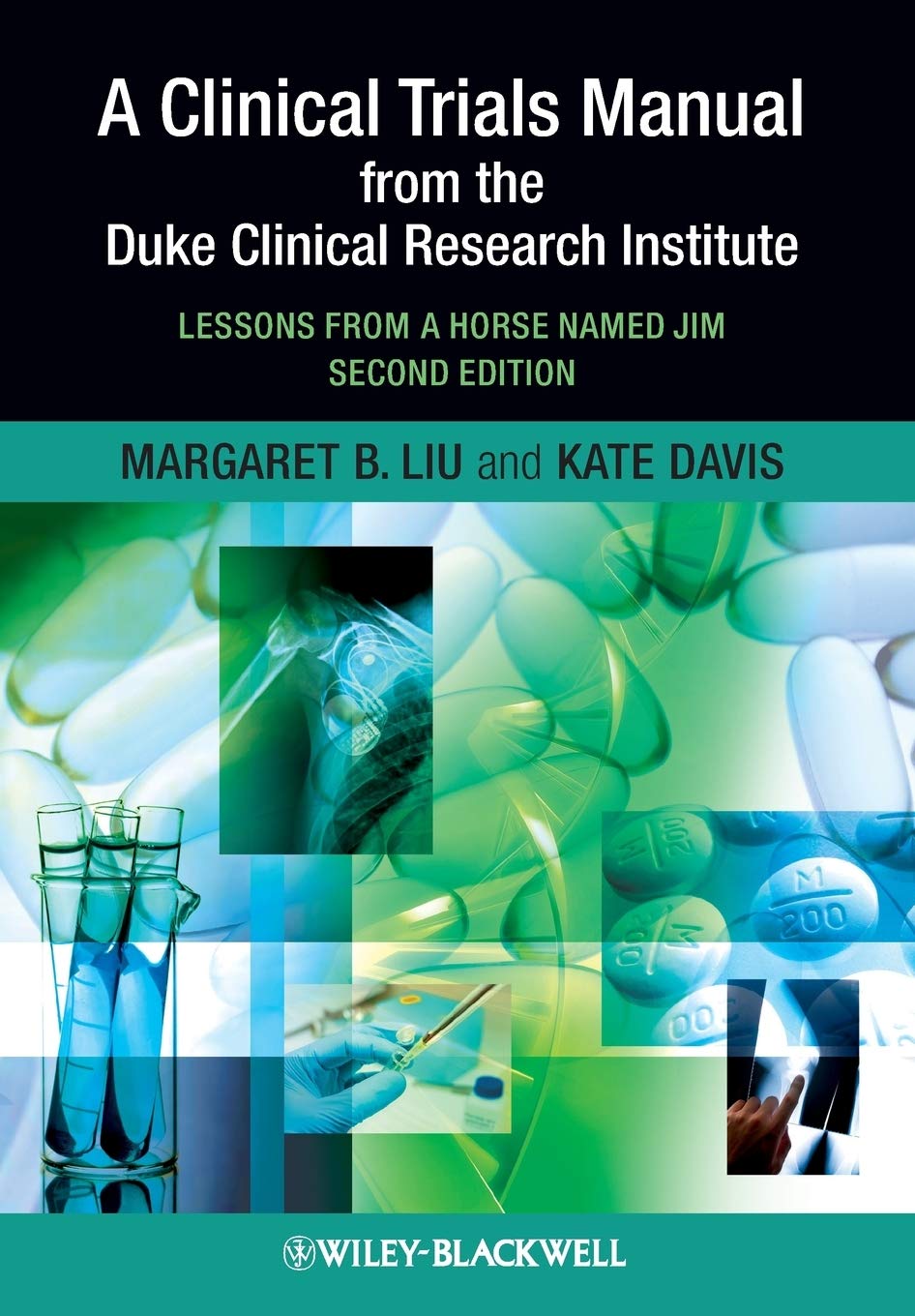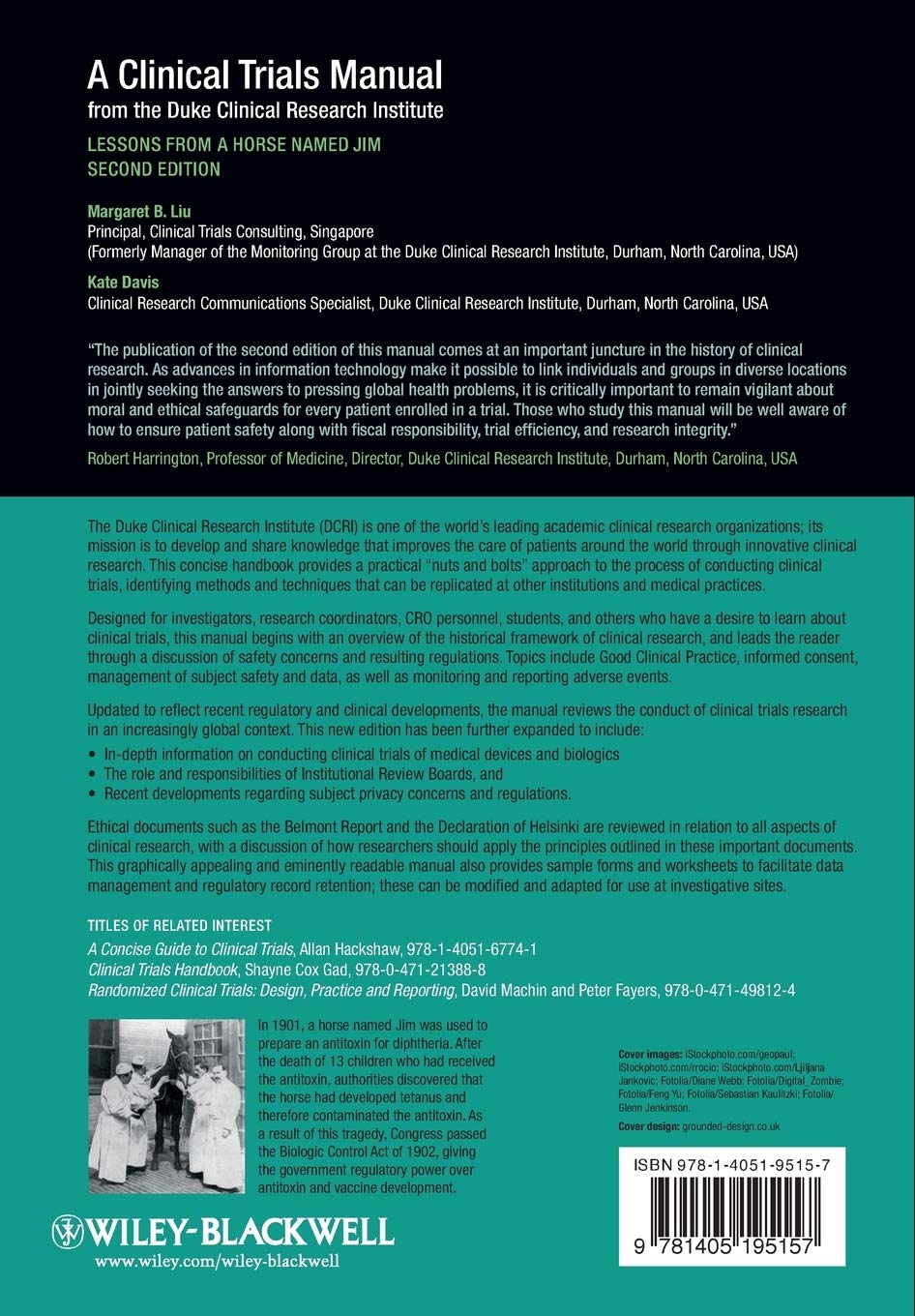-
 Thanh toán đa dạng, linh hoạtChuyển khoản ngân hàng, thanh toán tại nhà...
Thanh toán đa dạng, linh hoạtChuyển khoản ngân hàng, thanh toán tại nhà... -
 Miễn Phí vận chuyển 53 tỉnh thànhMiễn phí vận chuyển đối với đơn hàng trên 1 triệu
Miễn Phí vận chuyển 53 tỉnh thànhMiễn phí vận chuyển đối với đơn hàng trên 1 triệu -
 Yên Tâm mua sắmHoàn tiền trong vòng 7 ngày...
Yên Tâm mua sắmHoàn tiền trong vòng 7 ngày...
A Clinical Trials Manual From The Duke Clinical Research Institute: Lessons from a Horse Named Jim
-

- Mã sản phẩm: 1405195150
- (57 nhận xét)

- Publisher:Wiley-Blackwell; 2nd edition (February 8, 2010)
- Language:English
- Paperback:432 pages
- ISBN-10:1405195150
- ISBN-13:978-1405195157
- Item Weight:1.82 pounds
- Dimensions:6.78 x 0.92 x 9.7 inches
- Best Sellers Rank:#504,699 in Books (See Top 100 in Books) #864 in Pharmacology (Books) #1,562 in Healing #2,439 in Basic Medical Sciences
- Customer Reviews:4.5 out of 5 stars 56Reviews

Mô tả sản phẩm
Product Description
"The publication of the second edition of this manual comes at an important juncture in the history of clinical research. As advances in information technology make it possible to link individuals and groups in diverse locations in jointly seeking the answers to pressing global health problems, it is critically important to remain vigilant about moral and ethical safeguards for every patient enrolled in a trial. Those who study this manual will be well aware of how to ensure patient safety along with fiscal responsibility, trial efficiency, and research integrity."
―Robert Harrington, Professor of Medicine, Director, Duke Clinical Research Institute, Durham, North Carolina, USA
The Duke Clinical Research Institute (DCRI) is one of the world's leading academic clinical research organizations; its mission is to develop and share knowledge that improves the care of patients around the world through innovative clinical research. This concise handbook provides a practical "nuts and bolts" approach to the process of conducting clinical trials, identifying methods and techniques that can be replicated at other institutions and medical practices.
Designed for investigators, research coordinators, CRO personnel, students, and others who have a desire to learn about clinical trials, this manual begins with an overview of the historical framework of clinical research, and leads the reader through a discussion of safety concerns and resulting regulations. Topics include Good Clinical Practice, informed consent, management of subject safety and data, as well as monitoring and reporting adverse events.
Updated to reflect recent regulatory and clinical developments, the manual reviews the conduct of clinical trials research in an increasingly global context. This new edition has been further expanded to include:
- In-depth information on conducting clinical trials of medical devices and biologics
- The role and responsibilities of Institutional Review Boards, and
- Recent developments regarding subject privacy concerns and regulations.
Ethical documents such as the Belmont Report and the Declaration of Helsinki are reviewed in relation to all aspects of clinical research, with a discussion of how researchers should apply the principles outlined in these important documents. This graphically appealing and eminently readable manual also provides sample forms and worksheets to facilitate data management and regulatory record retention; these can be modified and adapted for use at investigative sites.
Review
"This is an excellent guide to how to conduct clinical trials of medical devices and biologics in the light of recent regulatory and clinical developments. The roles and responsibilities of institutional review boards and recent developments regarding subject privacy concerns and regulations are well covered. This manual also provides sample forms and worksheets for data management." (Doody's, 5 August 2011)
"A Clinical Trials Manual from the Duke Clinical Research Institute: Lessons from a Horse Named Jim, 2nd Edition" is a good introduction to clinical research, primarily from the site perspective. The book gives readers a solid foundation of principles and knowledge." (Journal of Clinical Research Best Practices, 8 August 2011)
From the Inside Flap
"The publication of the second edition of this manual comes at an important juncture in the history of clinical research. As advances in information technology make it possible to link individuals and groups in diverse locations in jointly seeking the answers to pressing global health problems, it is critically important to remain vigilant about moral and ethical safeguards for every patient enrolled in a trial. Those who study this manual will be well aware of how to ensure patient safety along with fiscal responsibility, trial efficiency, and research integrity."
—Robert Harrington, Professor of Medicine, Director, Duke Clinical Research Institute, Durham, North Carolina, USA
The Duke Clinical Research Institute (DCRI) is one of the world's leading academic clinical research organizations; its mission is to develop and share knowledge that improves the care of patients around the world through innovative clinical research. This concise handbook provides a practical "nuts and bolts" approach to the process of conducting clinical trials, identifying methods and techniques that can be replicated at other institutions and medical practices.
Designed for investigators, research coordinators, CRO personnel, students, and others who have a desire to learn about clinical trials, this manual begins with an overview of the historical framework of clinical research, and leads the reader through a discussion of safety concerns and resulting regulations. Topics include Good Clinical Practice, informed consent, management of subject safety and data, as well as monitoring and reporting adverse events.
Updated to reflect recent regulatory and clinical developments, the manual reviews the conduct of clinical trials research in an increasingly global context. This new edition has been further expanded to include:
- In-depth information on conducting clinical trials of medical devices and biologics
- The role and responsibilities of Institutional Review Boards, and
- Recent developments regarding subject privacy concerns and regulations
Ethical documents such as the Belmont Report and the Declaration of Helsinki are reviewed in relation to all aspects of clinical research, with a discussion of how researchers should apply the principles outlined in these important documents. This graphically appealing and eminently readable manual also provides sample forms and worksheets to facilitate data management and regulatory record retention; these can be modified and adapted for use at investigative sites.
From the Back Cover
"The publication of the second edition of this manual comes at an important juncture in the history of clinical research. As advances in information technology make it possible to link individuals and groups in diverse locations in jointly seeking the answers to pressing global health problems, it is critically important to remain vigilant about moral and ethical safeguards for every patient enrolled in a trial. Those who study this manual will be well aware of how to ensure patient safety along with fiscal responsibility, trial efficiency, and research integrity."
―Robert Harrington, Professor of Medicine, Director, Duke Clinical Research Institute, Durham, North Carolina, USA
The Duke Clinical Research Institute (DCRI) is one of the world's leading academic clinical research organizations; its mission is to develop and share knowledge that improves the care of patients around the world through innovative clinical research. This concise handbook provides a practical "nuts and bolts" approach to the process of conducting clinical trials, identifying methods and techniques that can be replicated at other institutions and medical practices.
Designed for investigators, research coordinators, CRO personnel, students, and others who have a desire to learn about clinical trials, this manual begins with an overview of the historical framework of clinical research, and leads the reader through a discussion of safety concerns and resulting regulations. Topics include Good Clinical Practice, informed consent, management of subject safety and data, as well as monitoring and reporting adverse events.
Updated to reflect recent regulatory and clinical developments, the manual reviews the conduct of clinical trials research in an increasingly global context. This new edition has been further expanded to include:
- In-depth information on conducting clinical trials of medical devices and biologics
- The role and responsibilities of Institutional Review Boards, and
- Recent developments regarding subject privacy concerns and regulations
Ethical documents such as the Belmont Report and the Declaration of Helsinki are reviewed in relation to all aspects of clinical research, with a discussion of how researchers should apply the principles outlined in these important documents. This graphically appealing and eminently readable manual also provides sample forms and worksheets to facilitate data management and regulatory record retention; these can be modified and adapted for use at investigative sites.
About the Author
Margaret Liu is a clinical trials consultant based in Singapore and former manager of the Monitoring Group at the Duke Clinical Research Institute (DCRI).
Kate Davis is Business Development Specialist for DCRI Communications Group, Durham, NC, US.
- Mua astaxanthin uống có tốt không? Mua ở đâu? 29/10/2018
- Saffron (nhụy hoa nghệ tây) uống như thế nào cho hợp lý? 29/09/2018
- Saffron (nghệ tây) làm đẹp như thế nào? 28/09/2018
- Giải đáp những thắc mắc về viên uống sinh lý Fuji Sumo 14/09/2018
- Công dụng tuyệt vời từ tinh chất tỏi với sức khỏe 12/09/2018
- Mua collagen 82X chính hãng ở đâu? 26/07/2018
- NueGlow mua ở đâu giá chính hãng bao nhiêu? 04/07/2018
- Fucoidan Chính hãng Nhật Bản giá bao nhiêu? 18/05/2018
- Top 5 loại thuốc trị sẹo tốt nhất, hiệu quả với cả sẹo lâu năm 20/03/2018
- Footer chi tiết bài viết 09/03/2018
- Mã vạch không thể phân biệt hàng chính hãng hay hàng giả 10/05/2023
- Thuốc trắng da Ivory Caps chính hãng giá bao nhiêu? Mua ở đâu? 08/12/2022
- Nên thoa kem trắng da body vào lúc nào để đạt hiệu quả cao? 07/12/2022
- Tiêm trắng da toàn thân giá bao nhiêu? Có an toàn không? 06/12/2022
- Top 3 kem dưỡng trắng da được ưa chuộng nhất hiện nay 05/12/2022
- Uống vitamin C có trắng da không? Nên uống như thế nào? 03/12/2022
- [email protected]
- Hotline: 0909977247
- Hotline: 0908897041
- 8h - 17h Từ Thứ 2 - Thứ 7
Đăng ký nhận thông tin qua email để nhận được hàng triệu ưu đãi từ Muathuoctot.com
Tạp chí sức khỏe làm đẹp, Kem chống nắng nào tốt nhất hiện nay Thuoc giam can an toan hiện nay, thuoc collagen, thuoc Dong trung ha thao , thuoc giam can LIC, thuoc shark cartilage thuoc collagen youtheory dau ca omega 3 tot nhat, dong trung ha thao aloha cua my, kem tri seo hieu qua, C ollagen shiseido enriched, và collagen shiseido dạng viên , Collagen de happy ngăn chặn quá trình lão hóa, mua hang tren thuoc virility pills vp-rx tri roi loan cuong duong, vitamin e 400, dieu tri bang thuoc fucoidan, kem chống nhăn vùng mắt, dịch vụ giao hang nhanh nội thành, crest 3d white, fine pure collagen, nên mua collagen shiseido ở đâu, làm sáng mắt, dịch vụ cho thue kho lẻ tại tphcm, thực phẩm tăng cường sinh lý nam, thuoc prenatal bổ sung dinh dưỡng, kem đánh răng crest 3d white, hỗ trợ điều trị tim mạch, thuốc trắng da hiệu quả giúp phục hồi da. thuốc mọc tóc biotin
























 KHUYẾN MÃI LỚN
KHUYẾN MÃI LỚN Hỗ Trợ Xương Khớp
Hỗ Trợ Xương Khớp Bổ Não & Tăng cường Trí Nhớ
Bổ Não & Tăng cường Trí Nhớ Bổ Sung Collagen & Làm Đẹp
Bổ Sung Collagen & Làm Đẹp Bổ Thận, Mát Gan & Giải Độc
Bổ Thận, Mát Gan & Giải Độc Chăm Sóc Sức khỏe Nam Giới
Chăm Sóc Sức khỏe Nam Giới Chăm Sóc Sức khỏe Nữ Giới
Chăm Sóc Sức khỏe Nữ Giới Chăm sóc Sức khỏe Trẻ Em
Chăm sóc Sức khỏe Trẻ Em Thực Phẩm Giảm Cân, Ăn Kiêng
Thực Phẩm Giảm Cân, Ăn Kiêng Bổ Sung Vitamin & Khoáng Chất
Bổ Sung Vitamin & Khoáng Chất Bổ Tim Mạch, Huyết Áp & Mỡ Máu
Bổ Tim Mạch, Huyết Áp & Mỡ Máu Bổ Mắt & Tăng cường Thị lực
Bổ Mắt & Tăng cường Thị lực Điều Trị Tai Mũi Họng
Điều Trị Tai Mũi Họng Sức Khỏe Hệ Tiêu hóa
Sức Khỏe Hệ Tiêu hóa Chăm Sóc Răng Miệng
Chăm Sóc Răng Miệng Chống Oxy Hóa & Tảo Biển.
Chống Oxy Hóa & Tảo Biển.